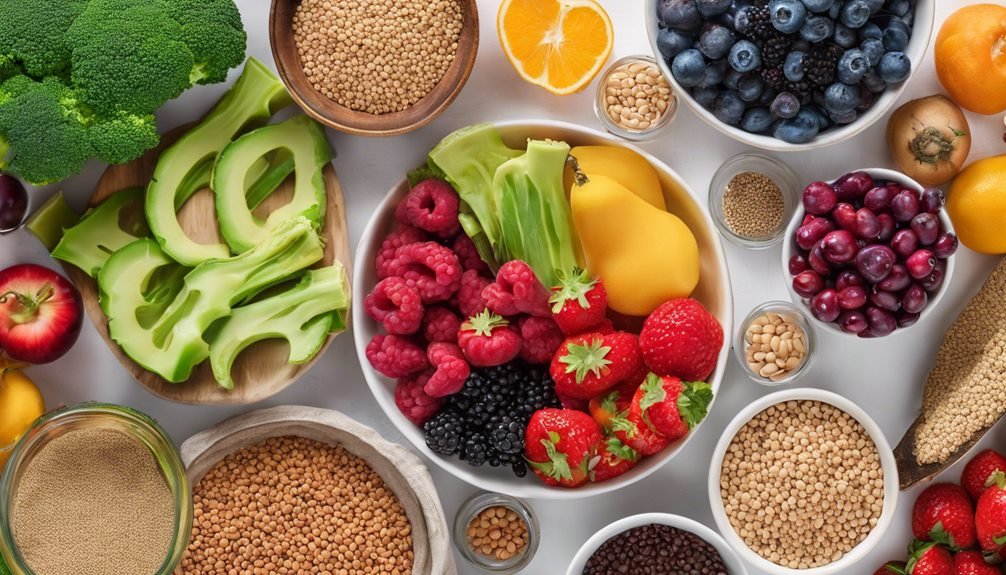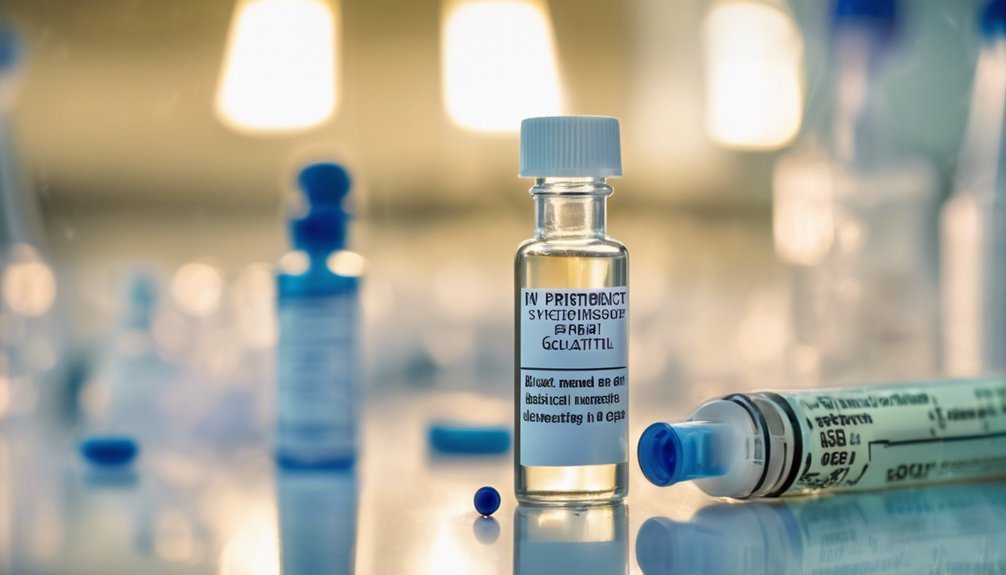Imagine fiber as a silent guardian within your body, working diligently to shield you from the threat of cancer. But how exactly does this humble nutrient play such a vital role in cancer prevention? Let's uncover the intricate ways in which fiber interacts with your body's defense mechanisms and explore the latest insights on how fiber-rich foods can be your allies in the battle against cancer.
Key Takeaways
- Fiber reduces cancer risk by promoting gut health and immunity.
- Adequate fiber intake aids in weight management and inflammation reduction.
- Different types of fiber support natural defense mechanisms against cancer.
- Fiber-rich diet prevents digestive disorders and maintains overall well-being.
- Daily fiber intake of 25-30 grams crucial for cancer prevention.
Importance of Fiber in Cancer Prevention
When considering the role of fiber in cancer prevention, it's essential to understand the significant impact this dietary component can have on your overall health. Fiber plays a crucial role in boosting immunity by promoting the growth of beneficial gut bacteria, which in turn helps in fighting off infections and diseases, including cancer. Including fiber-rich foods in your diet can help enhance your body's natural defense mechanisms, making it more resilient to various health threats.
To incorporate more fiber into your daily meals, consider trying out fiber-rich recipes such as whole grain salads, vegetable stir-fries, or fruit smoothies with added chia seeds or flaxseeds. These recipes not only provide essential nutrients but also contribute to your fiber intake, supporting a healthy immune system and potentially reducing the risk of cancer.
Fiber's Impact on Digestive Health
Considering the impact of fiber on cancer prevention, it's evident that its benefits extend to digestive health as well. Fiber plays a crucial role in maintaining a healthy gut microbiota, the community of microorganisms living in your intestines. By consuming an adequate amount of fiber-rich foods, you can support the growth of beneficial bacteria in your gut, which can aid in digestion and overall gut health.
Furthermore, fiber helps prevent digestive disorders such as constipation, diverticulitis, and irritable bowel syndrome. It adds bulk to your stool, making it easier to pass, thus reducing the risk of constipation. Additionally, fiber can help prevent diverticulitis by promoting regular bowel movements and reducing pressure in the colon.
Incorporating fiber into your diet through fruits, vegetables, whole grains, and legumes is a practical way to support your digestive health. By nourishing your gut microbiota and preventing digestive disorders, fiber plays a vital role in maintaining overall digestive wellness.
Types of Cancer Fiber Can Prevent

To understand the types of cancer that fiber can prevent, it's essential to recognize the significant role that dietary fiber plays in reducing the risk of various cancers.
Fiber has been found to have a protective effect against lung cancer. Studies suggest that a high intake of fiber-rich foods can lower the risk of developing lung cancer.
Additionally, fiber plays a role in preventing skin cancer. By promoting healthy digestion and aiding in the elimination of toxins from the body, fiber can help reduce the risk of skin cancer.
Including a variety of fiber sources in your diet, such as fruits, vegetables, whole grains, and legumes, can contribute to a lower likelihood of developing these types of cancer. Remember to make healthy choices and prioritize fiber-rich foods to support your overall well-being and reduce the risk of cancer.
Research on Fiber and Cancer Risk
Moving on to the research aspect, it's important to highlight the substantial body of evidence supporting the link between fiber intake and cancer risk. Research has shown that fiber plays a crucial role in reducing cancer risk through various mechanisms, including its impact on inflammation and obesity. Here are some key points to consider:
- Fiber and Inflammation: Fiber-rich diets have been linked to lower levels of inflammation in the body, which is a significant factor in the development of various types of cancer.
- Fiber and Obesity: High-fiber foods are known to promote weight management and reduce the risk of obesity, a condition associated with an increased likelihood of cancer.
- Research Findings: Numerous studies have consistently demonstrated the protective effects of fiber against different types of cancer, highlighting its importance in cancer prevention.
- Recommendations: Health organizations recommend consuming an adequate amount of fiber daily to lower cancer risk, emphasizing the importance of incorporating fiber-rich foods into your diet.
Fiber's Role in Colorectal Cancer

In understanding the relationship between fiber intake and colorectal cancer risk, it becomes evident that fiber plays a crucial role in the prevention of this particular type of cancer. Fiber-rich foods aid in maintaining a healthy digestive system and promoting regular bowel movements, which are key factors in reducing the risk of colorectal cancer. Additionally, fiber helps to keep the gut microbiota balanced, which is essential for overall gut health.
| Benefit of Fiber in Colorectal Cancer Prevention |
|---|
| Provides bulk to stool, aiding in waste removal |
| Fermented by gut bacteria, producing beneficial compounds |
When considering fiber intake for colorectal cancer prevention, consuming a variety of fruits, vegetables, whole grains, and legumes is recommended. While fiber supplements can be useful for some individuals, it is essential to prioritize obtaining fiber through whole foods for maximum prebiotic benefits. Prebiotics, found in fiber-rich foods, nourish the beneficial bacteria in the gut, contributing to a healthier digestive system and potentially lowering the risk of colorectal cancer.
Fiber's Influence on Breast Cancer
Research suggests that fiber intake may play a significant role in influencing the risk of breast cancer. Here are four key points to consider:
- Reduced Risk: Adequate dietary fiber intake has been linked to a lower risk of developing breast cancer. Fiber-rich foods help maintain a healthy weight, which is a crucial factor in reducing breast cancer risk.
- Hormone Regulation: Dietary fiber can aid in balancing hormone levels, particularly estrogen. High levels of estrogen have been associated with an increased risk of breast cancer, and fiber can help eliminate excess estrogen from the body.
- Anti-inflammatory Effects: Fiber possesses anti-inflammatory properties that can help reduce chronic inflammation, which is a known factor in the development of various types of cancer, including breast cancer.
- Healthy Microbiome: Fiber promotes the growth of beneficial gut bacteria, which play a role in maintaining a healthy immune system. A balanced microbiome can help prevent inflammation and oxidative stress, both of which are linked to breast cancer risk.
Best Sources of Cancer-Fighting Fiber

Considering the significant impact of fiber intake on breast cancer risk, it is crucial to identify the best sources of cancer-fighting fiber in your diet. To boost your fiber intake, incorporate foods rich in fiber such as fruits, vegetables, whole grains, legumes, nuts, and seeds. Additionally, consider adding fiber supplements to your routine, but remember that whole foods are the best sources of fiber due to their additional nutrients and health benefits.
Here is a table showcasing some excellent sources of cancer-fighting fiber:
| Fiber-Rich Foods | Serving Size | Fiber Content (g) |
|---|---|---|
| Lentils | 1 cup | 15.6 |
| Avocado | 1 medium | 10 |
| Chia Seeds | 1 oz | 9.8 |
| Raspberries | 1 cup | 8 |
| Whole Wheat Pasta | 1 cup | 6 |
Incorporating these foods into your diet can help you increase your fiber intake and potentially reduce the risk of cancer. For added inspiration, explore fiber-rich recipes that include these ingredients to make your meals both delicious and nutritious.
How Fiber Supports Immune Function
Supporting immune function, fiber plays a pivotal role in maintaining overall health and well-being. By bolstering the immune system and promoting gut health, fiber contributes to your body's ability to fight off illnesses and infections effectively. Here are four ways in which fiber supports your immune function:
- Enhancing Gut Health: Fiber acts as a prebiotic, feeding the beneficial bacteria in your gut. A healthy gut microbiome is crucial for a robust immune system.
- Reducing Inflammation: Fiber helps regulate inflammation in the body, which is essential for proper immune function. Chronic inflammation can impair the immune response.
- Supporting Immune Cell Production: Certain types of fiber can stimulate the production of immune cells in the gut, strengthening your body's defense mechanisms.
- Balancing the Immune Response: Fiber assists in maintaining a balanced immune response, preventing overreactions that can lead to autoimmune conditions.
Fiber's Anti-inflammatory Effects

Given the role of fiber in supporting immune function, it's worth noting that fiber also exerts significant anti-inflammatory effects in the body. Fiber's role in inflammation is crucial as chronic inflammation is linked to the development of various diseases, including cancer. By consuming an adequate amount of fiber, you can help reduce inflammation and support your overall health.
| Impact of Fiber on Immune Response | Benefits of Fiber's Anti-inflammatory Effects |
|---|---|
| Fiber promotes a healthy gut microbiome, which plays a key role in regulating immune function | Reduces levels of inflammatory markers in the body |
| Enhances the production of short-chain fatty acids that have anti-inflammatory properties | Helps in managing chronic inflammatory conditions |
| Supports the growth of beneficial bacteria, which can positively influence the immune system | Aids in preventing diseases associated with inflammation |
Incorporating fiber-rich foods like fruits, vegetables, whole grains, and legumes into your diet can help you harness these anti-inflammatory benefits and protect yourself from the harmful effects of chronic inflammation.
Optimal Fiber Intake for Cancer Prevention
For optimal cancer prevention, ensuring you consume an adequate amount of fiber is crucial. Fiber consumption plays a significant role in reducing the risk of cancer, making it essential to include fiber-rich foods in your daily diet. Here are four key points to help you understand the importance of fiber intake for cancer prevention:
- Recommended Daily Intake: Aim for at least 25-30 grams of fiber per day for adults to support overall health and lower cancer risk.
- Types of Fiber: Incorporate both soluble and insoluble fiber sources like fruits, vegetables, whole grains, legumes, and nuts to maximize the benefits for cancer prevention.
- Mechanism of Action: Fiber aids in maintaining a healthy digestive system, promoting regular bowel movements, and reducing inflammation, which are all crucial in preventing cancer development.
- Consistent Intake: Make it a habit to include fiber in every meal to ensure you meet your daily requirements and support your body's natural defense mechanisms against cancer.
Fiber-Rich Diet Recommendations

To maximize the benefits of fiber for cancer prevention, incorporating a variety of fiber-rich foods into your daily diet is essential. Aim to include whole grains like oats, barley, and quinoa, as well as fruits such as berries, oranges, and apples. Vegetables like broccoli, carrots, and spinach are also excellent sources of fiber. Legumes like beans, lentils, and chickpeas are great additions to meals for a fiber boost.
In addition to whole foods, consider exploring fiber-rich recipes that incorporate these ingredients creatively. Experiment with dishes like vegetable stir-fries, bean salads, and whole grain bowls to make your meals both nutritious and delicious.
If you find it challenging to meet your daily fiber needs through food alone, fiber supplements can be a helpful option. However, it's important to consult with a healthcare provider before starting any supplements to ensure they're suitable for you.
Incorporating Fiber Into Daily Meals
Looking to incorporate more fiber into your daily meals? Here are some practical tips to help you boost your fiber intake and promote overall health:
- Include Fiber-Rich Foods: Incorporate more fruits, vegetables, whole grains, legumes, nuts, and seeds into your meals. These foods are great natural sources of fiber.
- Try Fiber Supplements: If you struggle to get enough fiber from your diet alone, consider adding fiber supplements to your routine. Be sure to consult with a healthcare provider before starting any new supplement.
- Experiment with Fiber Smoothies: Blend together fruits, vegetables, and a fiber source like chia seeds or flaxseeds to create delicious and nutritious fiber-packed smoothies.
- Gradually Increase Fiber Intake: To prevent digestive discomfort, gradually increase your fiber intake and drink plenty of water throughout the day to help fiber move through your digestive system smoothly.
Frequently Asked Questions
Can Fiber Prevent All Types of Cancer?
Fiber can contribute to reducing the risk of certain cancers, but it's not a guarantee against all types. Different fiber types, like soluble and insoluble, play a role in cancer prevention by promoting healthy digestion and reducing inflammation.
While including fiber-rich foods in your diet can be beneficial, it's essential to maintain an overall balanced and healthy lifestyle to lower your cancer risk. Remember, prevention strategies should encompass various factors beyond just fiber intake.
Does Fiber Intake Affect Cancer Treatment Outcomes?
Imagine how adding fiber supplements or increasing dietary sources could influence your cancer treatment outcomes. Research suggests that fiber intake may play a role in supporting the effectiveness of cancer treatments. By incorporating more fiber into your diet, you may potentially enhance your body's ability to respond positively to treatment.
This simple adjustment may offer a practical and evidence-based way to optimize your cancer care journey.
Are There Specific Types of Fiber to Avoid?
When considering fiber sources, opt for whole foods like fruits, vegetables, whole grains, and legumes over processed options.
Fiber supplements can be helpful, but avoid those with added sugars or artificial ingredients.
Be sure to stay hydrated when increasing fiber intake to aid digestion.
Can Fiber Intake Reduce Cancer Recurrence Risk?
Boost your chance at outsmarting cancer by upping your fiber game! Dietary fiber benefits could play a crucial role in your fight against cancer recurrence. Research suggests that fiber and survival are linked, offering hope for a brighter, healthier future.
Incorporating fiber-rich foods into your diet may reduce cancer recurrence risk, enhancing your overall well-being. So, why not add a little extra fiber to your plate and stack the odds in your favor?
How Does Fiber Impact Hormone-Related Cancers?
Fiber plays a crucial role in hormone-related cancers like breast and prostate cancer. In breast cancer, fiber helps reduce estrogen levels, which can lower the risk of hormone-driven tumors.
For prostate cancer, fiber aids in regulating insulin and hormone levels, potentially decreasing the likelihood of cancer development.
Including fiber-rich foods in your diet, such as fruits, vegetables, and whole grains, can be a proactive step in supporting your overall health.
Conclusion
In conclusion, incorporating fiber into your daily diet can significantly reduce your risk of developing cancer by supporting your immune system, promoting gut health, and reducing inflammation. While some may find it challenging to increase fiber intake, small changes like adding fruits, vegetables, and whole grains to your meals can make a big impact on your overall health. Start small and gradually increase fiber-rich foods to reap the benefits of cancer prevention.





